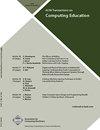Global Manager: A Serious Game to Raise Awareness of the Challenges of Being a Project Manager in Global Software Development
IF 3.2
3区 工程技术
Q1 EDUCATION, SCIENTIFIC DISCIPLINES
引用次数: 0
Abstract
Project managers tend to confront multiple challenges in Global Software Development (GSD), including misunderstandings about the project requirements, complex estimations of costs, risks, and efforts, along with increases in task allocation and a lack of coordination. “Soft skills” play a fundamental role in solving these challenges, as they are the human or social abilities that facilitate the resolution of conflicts and involve dealing with people and managing projects in their most social and creative dimension. However, developing the soft skills that allow project managers to lead in an effective manner is not an easy task, especially in global or distributed environments, where coordination and control problems are commonplace. One suitable mechanism with which to develop these soft skills is that of serious games, which focus on learning by doing and allow users to simulate real scenarios. The authors of this article are aware of the usefulness of this type of teaching method and have, therefore, developed the serious game described herein. This serious game is denominated as Global Manager and is focused on helping both students and novice project managers to become aware of the factors that may affect GSD projects. Global Manager was evaluated by means of a quasi-experiment based on a pretest-posttest design, which was used to assess whether the game can increase the players’ awareness and knowledge of the factors that a project manager should consider in GSD projects. The results obtained after evaluating the game were quite satisfactory, as the game taught the players to differentiate between global and distributed software projects and to experience situations that may and do occur in these settings. Furthermore, Global Manager helped improve players' perceptions of the importance of different influencing factors in GSD.全球经理:一个严肃的游戏,提高认识的挑战,成为一个项目经理在全球软件开发
项目经理在全球软件开发(GSD)中往往面临多重挑战,包括对项目需求的误解、对成本、风险和努力的复杂估计,以及任务分配的增加和缺乏协调。“软技能”在解决这些挑战方面发挥着根本作用,因为它们是促进解决冲突的人类或社会能力,涉及与人打交道和管理最具社会性和创造性的项目。然而,开发使项目经理能够有效领导的软技能并不是一项容易的任务,尤其是在全球或分布式环境中,协调和控制问题很常见。开发这些软技能的一个合适机制是严肃游戏,它专注于边做边学,并允许用户模拟真实场景。本文的作者意识到这种教学方法的有用性,因此开发了本文所述的严肃游戏。这个严肃的游戏被命名为“全球经理”,专注于帮助学生和新手项目经理意识到可能影响GSD项目的因素。Global Manager是通过基于前测后测设计的准实验进行评估的,该设计用于评估游戏是否可以提高玩家对项目经理在GSD项目中应该考虑的因素的意识和知识。评估游戏后获得的结果非常令人满意,因为游戏教会玩家区分全局软件项目和分布式软件项目,并体验在这些环境中可能发生的情况。此外,Global Manager帮助提高了参与者对GSD中不同影响因素重要性的认知。
本文章由计算机程序翻译,如有差异,请以英文原文为准。
求助全文
约1分钟内获得全文
求助全文
来源期刊

ACM Transactions on Computing Education
EDUCATION, SCIENTIFIC DISCIPLINES-
CiteScore
6.50
自引率
16.70%
发文量
66
期刊介绍:
ACM Transactions on Computing Education (TOCE) (formerly named JERIC, Journal on Educational Resources in Computing) covers diverse aspects of computing education: traditional computer science, computer engineering, information technology, and informatics; emerging aspects of computing; and applications of computing to other disciplines. The common characteristics shared by these papers are a scholarly approach to teaching and learning, a broad appeal to educational practitioners, and a clear connection to student learning.
 求助内容:
求助内容: 应助结果提醒方式:
应助结果提醒方式:


